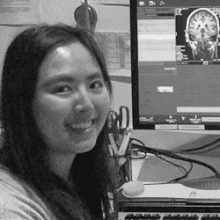Isabella Hoi Kei Leung
Computerised cognitive training in insidious late life cognitive decline

Award
AADRF - Dementia Collaborative Research Centre Half-funded PhD Scholarship
Status
Completed
Start Date
24 March 2015
About the project
A randomised clinical trial is currently being conducted at the Brain and Mind Centre, University of Sydney. The Trajectories trial will examine the efficacy of computerised cognitive training in reducing the rate of decline in memory and other cognitive abilities (Phase I). Trajectories will also examine whether booster doses of the computerised cognitive training are able to maintain cognitive gains in the long-term (Phase II). Recruited individuals are those aged 60 and over with clinical memory decline (but do not meet the diagnostic criteria for dementia and free from other neurological and psychological disorders). Magnetic Resonance Imaging (MRI), neuropsychological testing and behavioural outcomes will be measured at baseline and each time point of the trial (at baseline, after phase I and after phase II). Further, this trial will investigate whether baseline qualities (brain volume, gene expressions) may determine for whom computerised cognitive training benefits most i.e. baseline predictors of response.
A randomised active controlled trial is currently being conducted. 86 patients will be recruited from the Healthy Brain Ageing Clinic at the Brain and Mind Centre, University of Sydney and the Memory Disorders Clinic at Prince of Wales Hospital, Sydney. Participants are randomly assigned in a 1:1 ratio to either the computerised cognitive training arm using the Captain’s Log Mind Power Builder software or active control arm. High-intensity, supervised, centre-based training will be completed 60 minutes per session, twice a week, for a total of three months (Phase I) followed by maintenance low-intensity sessions for 15 months (Phase II). The primary outcome measure will be effects of computerised cognitive training on memory function. Neuropsychological assessment, daily functioning measures and MRI will be administered at pre-training and at the end of each phase to detect training-related gains.
We hypothesise that computerised cognitive training can lead to an improvement in memory and that long-term maintenance training will provide a clinically realistic and practical intervention in the prevention of dementia.
Where are they now?
Ms Leung is is currently enrolled as a PhD candidate at The University of Sydney.
